In the deep forests in Africa and Indian subcontinent there are two powerful creatures living. Sloth Bear vs Lion, What if they clash? Who Will Win? Sloth bear, known for its unpredictable aggression and powerful claws, and the lion, the iconic king of beasts with strength and hunting skills.
Sometimes they meet in ranges in some parts of India but still direct fights are so rare. But what would happen if these two powerful animals forced in to a face to face fight? In this thrilling comparison of Sloth Bear vs Lion, we will explore their physical abilities, behavioral traits, and combat skills to determine who would win in an prolonged battle.
- Sloth bear (Melursus ursinus)
- Lion (Panthera leo)
Keep reading till the end, You will be able to learn about Sloth Bear vs Lion mind blowing specifications and their features, Enjoy!
1. Physical Characteristics
| Subtopic | Sloth Bear | Lion | Winner |
|---|---|---|---|
| Average Weight | 100–145 kg (male) | 150–225 kg (male) | Lion |
| Average Length | 1.5–1.9 m | 1.8–2.1 m (body only) | Lion |
| Shoulder Height | ~85 cm | ~110–120 cm | Lion |
| Build Type | Shaggy, rounded, compact | Muscular, athletic, lean | Lion |
| Claw Length | ~7.5 cm (curved, digging) | ~4 cm (retractable, sharp) | Sloth Bear |
| Canine Size | ~4 cm | ~6–7 cm | Lion |
| Fur Density | Very shaggy | Short, tawny coat; males have manes | Draw |
| Paw Size | Large, broad | Large, padded | Sloth Bear |
| Tail Length | Short (~15 cm) | ~60–90 cm | Lion |
| Mane (Males) | None | Present (intimidation, defense) | Lion |
Topic Winner: Lion
2. Habitat and Range – Sloth Bear vs Lion
| Subtopic | Sloth Bear | Lion | Winner |
|---|---|---|---|
| Natural Habitat | Forests, grasslands | Savannah, grasslands, woodlands | Draw |
| Geographic Range | Indian Subcontinent | Sub-Saharan Africa, Gir Forest (India) | Lion |
| Habitat Adaptability | Moderate | High | Lion |
| Temperature Tolerance | Tropical to subtropical | Hot, semi-arid | Draw |
| Terrain Preference | Hilly forests, caves | Open plains | Draw |
| Shelter Use | Dens in caves or underbrush | Dens, grass cover | Draw |
| Territory Size | 13–15 sq. km | 20–400 sq. km (pride-based) | Lion |
| Overlap with Humans | High (conflicts common) | High (human-wildlife conflict) | Draw |
| Environmental Threats | Deforestation, habitat fragmentation | Prey depletion, poaching | Draw |
| Range Shrinkage | Declining | Declining in many areas | Draw |
Topic Winner: Lion
3. Diet and Hunting – Sloth Bear vs Lion
| Subtopic | Sloth Bear | Lion | Winner |
|---|---|---|---|
| Primary Diet | Insects (termites, ants), fruit | Large ungulates (zebra, buffalo) | Lion |
| Hunting Technique | Sniff-dig-suction | Stalk, ambush, suffocation | Lion |
| Social Hunting | Solitary feeder | Cooperative hunting | Lion |
| Kill Method | Swipe and mauling | Throat/clamp bite | Lion |
| Prey Size | Small to medium | Medium to large | Lion |
| Foraging Style | Opportunistic nocturnal forager | Opportunistic diurnal/nocturnal hunter | Draw |
| Feeding Time | Night (primarily) | Day & night | Lion |
| Hunting Success Rate | Not applicable | ~30% (higher with teamwork) | Lion |
| Food Storage | None | Rare | Draw |
| Competition for Food | High (with leopards, tigers) | High (hyenas, leopards) | Draw |
Topic Winner: Lion
4. Intelligence and Learning
| Subtopic | Sloth Bear | Lion | Winner |
|---|---|---|---|
| Problem Solving | Moderate | High (strategic hunting) | Lion |
| Social Intelligence | Low | Very high (pride hierarchy) | Lion |
| Memory | Strong spatial memory | Strong memory of territory | Draw |
| Learning Ability | Fast learners (especially cubs) | High (observational learning) | Draw |
| Communication | Grunts, barks, roars | Roars, grunts, body language | Lion |
| Tool Use | None | None | Draw |
| Cub Teaching | Mother teaches survival skills | Group influence on cubs | Lion |
| Play Behavior | Cubs play actively | Strong social play | Lion |
| Conflict Avoidance | Loud displays, aggression | Displays, mane signals | Lion |
| Curiosity | Very curious and bold | Curious, strategic | Draw |
Topic Winner: Lion
5. Strength and Bite Force
| Subtopic | Sloth Bear | Lion | Winner |
|---|---|---|---|
| Bite Force (PSI) | ~800 PSI | ~650 PSI | Sloth Bear |
| Claw Strength | Powerful, curved claws | Sharp, retractable | Sloth Bear |
| Limb Power | Strong forelimbs for digging/fighting | Strong for wrestling prey | Draw |
| Swiping Power | Can injure humans and leopards | Deadly to prey animals | Lion |
| Muscle Mass | Compact and powerful | Dense, muscular | Lion |
| Grip Strength | Strong (for climbing, digging) | Strong (to pin prey) | Draw |
| Neck Strength | Moderate | Exceptionally strong | Lion |
| Attack Speed | Moderate | High | Lion |
| Durability | Tough hide and fur | Muscular build, tough skin | Draw |
| Bone-Crushing Ability | Low | Medium | Lion |
Topic Winner: Draw
6. Speed and Agility – Sloth Bear vs Lion
| Subtopic | Sloth Bear | Lion | Winner |
|---|---|---|---|
| Top Speed | ~40 km/h | ~80 km/h (short bursts) | Lion |
| Acceleration | Moderate | Very rapid over 20–30 m | Lion |
| Agility (on land) | Clumsy runner, quick swipes | Agile and nimble for size | Lion |
| Agility (in trees) | Excellent climber | Cannot climb well | Sloth Bear |
| Endurance | High endurance for foraging | Low endurance; tires quickly | Sloth Bear |
| Stamina in Fight | Can persist in mauling fights | Powerful but burns out fast | Sloth Bear |
| Reflexes | Sharp reflexes, reactive to threats | Fast reflexes during hunts | Draw |
| Swimming Ability | Poor swimmer | Average swimmer | Lion |
| Maneuverability | Moderate | Good for ambush predator | Lion |
| Terrain Navigation | Dense forest, rocky areas | Open savannah | Draw |
Topic Winner: Lion
7. Senses – Sloth Bear vs Lion
| Subtopic | Sloth Bear | Lion | Winner |
|---|---|---|---|
| Vision (Day) | Poor | Good | Lion |
| Vision (Night) | Very strong night vision | Excellent night vision | Draw |
| Hearing Range | Acute hearing | Acute, sensitive to prey movement | Draw |
| Olfactory Ability | Exceptionally developed (for insects) | Good but less than bears | Sloth Bear |
| Sense of Touch | Sensitive paws | Normal tactile sense | Sloth Bear |
| Response to Sound | Quick to react | Reacts to movement and rustles | Draw |
| Range of Smell | Up to several km | Less than bear’s range | Sloth Bear |
| Sound Communication | Snorts, roars, growls | Powerful roar audible 8 km away | Lion |
| Tracking Ability | Excellent for insects/fruits | Exceptional for mammalian prey | Draw |
| Use in Conflict | Relies more on smell | Uses vision and hearing for targeting | Draw |
Topic Winner: Draw
8. Reproduction and Lifespan
| Subtopic | Sloth Bear | Lion | Winner |
|---|---|---|---|
| Gestation Period | ~210 days | ~110 days | Lion |
| Litter Size | 1–2 cubs | 2–4 cubs | Lion |
| Cub Mortality Rate | High due to predators | High due to male infanticide | Draw |
| Parental Care | Intense maternal care, cubs ride on mom | Females raise cubs communally | Draw |
| Weaning Age | 2.5 years | 6–8 months | Sloth Bear |
| Sexual Maturity | 3–5 years | 3–4 years | Draw |
| Breeding Frequency | Every 2–3 years | Every 2 years | Lion |
| Lifespan (Wild) | ~20 years | ~10–14 years | Sloth Bear |
| Lifespan (Captivity) | Up to 40 years | ~20 years | Sloth Bear |
| Cubs’ Independence | Long maternal dependency | Earlier independence | Lion |
Topic Winner: Sloth Bear
9. Social Behavior – Sloth Bear vs Lion
| Subtopic | Sloth Bear | Lion | Winner |
|---|---|---|---|
| Social Structure | Solitary | Group-living (prides) | Lion |
| Territorial Range | Moderate (~15 sq km) | Large (20–400 sq km) | Lion |
| Territorial Marking | Scent marking, clawing trees | Urine marking, roaring | Draw |
| Conflict Style | Aggressive toward intruders | Territorial fights with intruders | Draw |
| Play Behavior | Common among cubs | Strong in cubs and subadults | Draw |
| Cooperation | Rare | Highly cooperative (hunting/defense) | Lion |
| Intraspecific Conflict | Avoids confrontation | Frequent among males | Sloth Bear |
| Communication Methods | Snorts, growls, barks | Roars, chuffs, moans | Lion |
| Bonding | Strong mother-cub bond | Strong pride relationships | Draw |
| Defense of Young | Ferocious maternal defense | Pride females cooperate | Draw |
Topic Winner: Lion
10. Conservation Status – Sloth Bear vs Lion
| Subtopic | Sloth Bear | Lion | Winner |
|---|---|---|---|
| IUCN Status | Vulnerable | Vulnerable | Draw |
| Global Population | ~7,000–10,000 | ~20,000–25,000 | Lion |
| Threats | Habitat loss, poaching | Habitat loss, poaching, trophy hunting | Draw |
| Habitat Fragmentation | Severe | Moderate to severe | Sloth Bear |
| Human Conflict | Frequent | Frequent | Draw |
| Conservation Programs | India-based programs | Multiple global efforts | Lion |
| Captive Breeding | Limited success | Widely implemented | Lion |
| Legal Protection | Schedule I (India) | CITES Appendix II | Sloth Bear |
| Rewilding Success | Not significant | Several rewilding initiatives | Lion |
| Ecological Role | Seed disperser, insect control | Apex predator | Draw |
Topic Winner: Lion
Face-to-Face Fight Analysis
In a direct fight between Sloth Bear vs Lion:
- The lion has a clear advantage in power, size, killing technique, and aggression. As an apex predator used to taking down large preys, its combat efficiency is much higher.
- The sloth bear, though fierce and with a powerful claw, is a defensive fighter by nature. Its confrontations are largely territorial or protective (especially of cubs), and it will usually repel leopards and even tigers by bluffing and endurance rather than raw strength.
Cornered, a sloth bear would fight viciously, but a lion would emerge victorious most often, especially in open terrain.
Fight Winner: Lion
Final Verdict: Overall Winner – Lion
Reasons Lion Wins:
- Superior physical size and strength – significantly larger and more muscular.
- Killing efficiency – trained to kill, with evolved hunting techniques.
- Social intelligence and cooperation – though irrelevant in 1v1, it defines lion strategy.
- Agility and speed – faster, better ambusher in open areas.
- Combat experience – used to fighting rivals and dangerous prey.
Why Sloth Bear Loses:
- More adapted to foraging and defense than attack.
- Lacks the muscle mass and killing instinct of a true carnivore.
- Wins against leopards or defends well, but cannot match a lion’s raw power.
Interesting Facts
Sloth Bear
-
Specialized for eating termites and ants, using a long snout and missing upper incisors to suck up insects efficiently.
-
Has shaggy black fur with a distinctive white “V” or “Y” marking on the chest.
-
Uses long, curved claws for digging and climbing.
-
Routinely carries cubs on its back, a unique trait among bears.
-
Highly aggressive when threatened and known to stand its ground against large predators like a boxer.
-
Active at night and mainly uses its strong sense of smell to find food.
-
Makes loud slurping sounds when eating honey or insects.
-
Lives in forests and grassy areas of the Indian subcontinent.
-
A medium-sized bear, usually weighing between 55 and 190 kilograms.
-
Lives alone, except during the breeding season or when a mother is caring for her cubs.
Lion
-
Often called the “king of the jungle,” but actually lives in open grasslands and savannas.
-
Biggest social cats, living in family groups called prides.
-
Adult males can weigh up to 190 kg and grow about 2 meters long.
-
Females do most of the hunting, often working together to catch large animals.
-
Can run up to 80 km/h, but only for short distances.
-
Has a loud roar that can be heard up to 8 kilometers away.
-
Male lions have manes that help protect them during fights.
-
Sleep around 20 hours a day to save energy.
-
Lion cubs are raised together by the pride.
-
Top predators, strong enough to hunt big animals like buffalo and young elephants.
References:
- IUCN Red List – Sloth Bear
- IUCN Red List – Lion
- Sunquist & Sunquist (2002) – Wild Cats of the World
- Menon, V. (2014). Indian Mammals: A Field Guide
- Nowak, R. M. (1999). Walker’s Mammals of the World
- Bauer, H., Packer, C. et al. (2015). Lion population dynamics.
- Garshelis, D. L., & Smith, J. L. D. (1999). Bears: Status Survey and Conservation Action Plan.
Read more – Sloth bear vs Black panther – Full Scientific Comparison
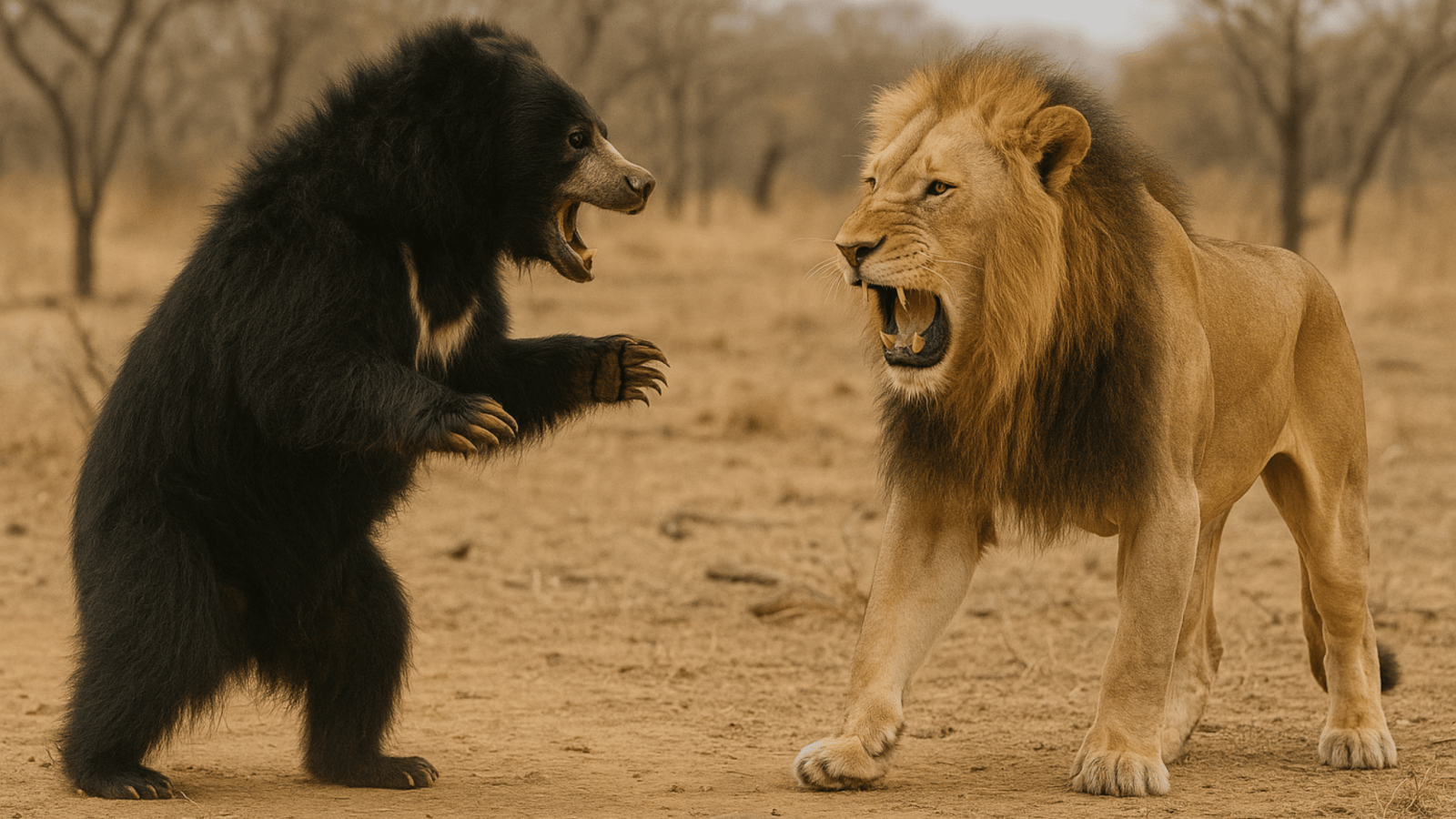
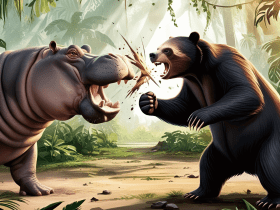
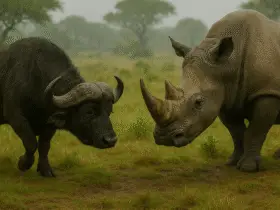
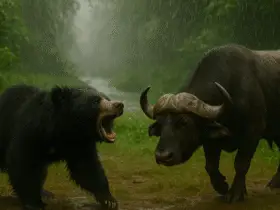

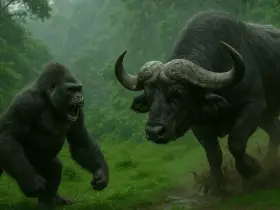
Leave a Reply